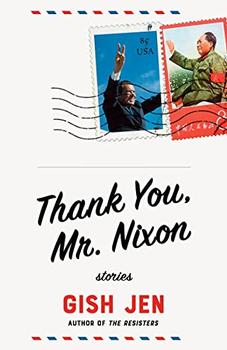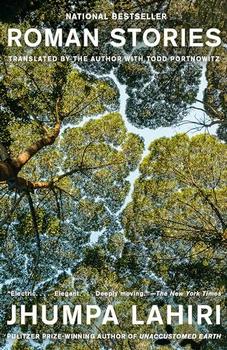Summary | Excerpt | Reviews | Beyond the book | Read-Alikes | Genres & Themes | Author Bio

Stories
by Gish JenThe title story in Gish Jen's collection Thank You, Mr. Nixon takes the form of a letter from Tricia Sang to President Richard Nixon. Tricia is currently in heaven, and Nixon is in hell. At the time of the former American leader's visit to her country in the 1970s, Tricia was one of several children he interacted with in what she reveals to have been a situation staged by the government. She now wishes to thank him for bringing along his wife Pat, whose beautiful red coat, according to Tricia, inspired desire in Chinese people even as it represented everything they had been taught to hate: American imperialism and bourgeois values. Tricia expresses sadness for Nixon's present predicament as well as his treatment by the American public, even as she concedes that his contributions to capitalism in her country may have "ruined what was left of Chinese culture."
The mildness of Tricia's attitude is characteristic of the subtle and warm but deceptively powerful humor that blooms throughout Jen's book, a gathering of often-linked stories exploring China's relationship with the rest of the world and the consequences of this relationship to individual people. The title story is funny because it gives Tricia a position of such power over Nixon — she knew more than he did in life and is now looking down on him in the afterlife — that she can afford to express the kind of heartfelt but ultimately useless sentiment that might appear in fan mail or on social media. "I thank you with all my heart, Mr. Nixon," she writes, "and am sorry for what happened to you."
This depiction runs counter to the narrow American perception of Chinese people and culture embodied in Tom and Tory Shore, a white couple from Cincinnati who appear in "It's the Great Wall!" and "A Tea Tale." Their interest in China is characterized by a possessive impulse that inspires them to make an ill-advised purchase of tea from a Chinese supplier to serve in their stateside café. After they fail to receive the quality shipment they were expecting, they proceed to adopt a Chinese child, a disturbing extension of their amusingly futile attempts to manifest control masquerading as love. Tricia's appreciation for Pat Nixon's coat offers a humorous counterpoint to this behavior; Tom and Tory see in Chinese culture some passive, elusive beauty that they think can be extracted for their own use, but Tricia, a Chinese person who uses her English name because she prefers it, wants the same thing they do — a pretty object, an aesthetic ideal.
Themes of possession, identity and aesthetics are further explored in other stories, including "Rothko, Rothko," in which Rich Lee, a Chinese American professor, is drawn into the world of art forgery, where he deals with an undocumented Chinese immigrant who specializes in reproductions of paintings by the artist Mark Rothko (see Beyond the Book), while also confronting a Chinese student who has been plagiarizing her English papers. All three of these characters appear genuinely dedicated to their areas of work or study, but are compelled to make moral compromises due to their financial struggles. In this way, Jen questions not just to what degree originality is a luxury, but also originality as an absolute value.
The stories in Thank You, Mr. Nixon carry a quality perhaps ironically best explained by Ming, the art forger, who suggests that Rothko's paintings are special because they contain something additional beneath the surface; they cannot be summed up: "[E]verything have something else inside. You cannot see it, but it is there."
Similarly, Jen's characters are not quite the logical outcome of their sociopolitical circumstances, but rather people who have fallen into particular, sometimes peculiar, crevices of existence, and they are exquisitely written. Her portrayal of them seems straightforward until suddenly it doesn't, such as in "Amaryllis," when the title character — the mixed-race Chinese American daughter of a couple who decades earlier met the Shores on a trip to Beijing — reacts to receiving original poetry from a man with whom she is reluctantly conducting an "e-affair":
I would be happy to be friends. But please do not write again until you have returned to your senses, by which I mean standard grammar, including standard punctuation. I love you.
One hardly has time to recover from the curveball of "I love you" thrown into an otherwise guarded and rigid message before the narrator jumps forward to ask, "Why did she write that? She hated him." The reader, already well-versed in Jen's gently delivered contradictions, may not believe this.
![]() This review was originally published in The BookBrowse Review in March 2022, and has been updated for the
November 2022 edition.
Click here to go to this issue.
This review was originally published in The BookBrowse Review in March 2022, and has been updated for the
November 2022 edition.
Click here to go to this issue.

If you liked Thank You, Mr. Nixon, try these:

by Jhumpa Lahiri
Published 2024
The first short story collection by the Pulitzer Prize–winning author and master of the form since her number one New York Times best seller Unaccustomed Earth • Rome—metropolis and monument, suspended between past and future, multi-faceted and metaphysical—is the protagonist, not the setting, of these nine stories

by Uche Okonkwo
Published 2024
A searing, unflinching collection of stories set in Nigeria that explores themes of community expectations, familial strife, and the struggle for survival.
Your guide toexceptional books
BookBrowse seeks out and recommends the best in contemporary fiction and nonfiction—books that not only engage and entertain but also deepen our understanding of ourselves and the world around us.